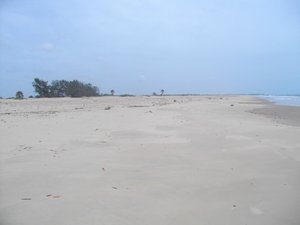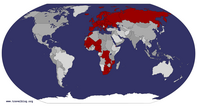Advertisement
Published: July 20th 2010

 Casamancee beach
Casamancee beach
miles and miles of beautiful, natural, deserted beachLeft Cap Skiring, a fishing village turned tourist headquarters (thanks to the Club Med built there), walked barefoot for 10km along the completely deserted beach stopping to swim and snack on wild fruits, came to the end of the peninsula and got slightly lost after heading into the bushes to find the village that I knew was nearby. Thankfully, one cannot get very lost on a peninsula and reaching the other side found a few people having an afternoon of swimming and barbecuing potatoes and oysters. They were, of course, completely welcoming and after joining them for their delicious meal we were walking back to the tiny village of Nikine where I ended up spending the next two weeks.
I believe that people who travel solely for “the sake of learning and experience” are honest in that reasoning, but there is something more to it; each one of us is searching for something personal that we cannot explain, but we know traveling brings us closer to it. For me I found part of that in Nikine. It is a completely isolated village, accessible only by foot or canoe, or the occasional 4WD that can pass along the beach at low
tide. They have no electricity, get their water from a well, and even people in the neighbouring island villages rarely visit, let alone tourists. Being in the mouth of the Casamance river means one side of their peninsula is a wide palm-lined sandy beach open to the warm waters of the Atlantic, and the other side is the calm canals of an oyster-filled mangrove. They have almost no regular need for money since their diet consists of food that comes directly from their land.
They taught me many things in my time there. The mornings started whenever the mother cows would return from their nights in the bush to feed the young calves, at which point we milked them for our daily breakfast of yogurt and rice (note: milking a cow is not easy, especially when it is slightly wild and keeps trying to kick your face). My other favorite part of the morning was hunting around the fruit trees to see if any coconuts or ripe mangos had fallen in the night, or checking the small carisol tree to see if any were soft enough to eat (the delicious South American fruit which in Peru goesby the name
'cherimoya'). Every day someone headed to the mangrove to fish (usually using a net) or set out with a machete at low tide to wade through the deep mud in search of fresh and delicious oysters, which we often grilled straight on the fire and chucked open for lunch or dinner (yes, lots of cut fingers figuring out the trick to that one). We also spent a lot of time doing the good, hard physical work that comes along with living off the land; I was there just before the start of the rainy season which meant getting the rice and maize fields ready to be planted after the first rains.
Learning to hunt for crabs was most memorable as far as food goes, and even I was a little hesitant to try it when I realized that after machete-ing apart the crab hole one mus stick in their arm to try and find the crab. Lying in the sand, armpit deep in a mud filled hole, feeling around for a crab and knowing that it would cut me quite painfully if I failed to pull its claws off quickly enough, I kept thinking to myself not only about
the Lonely Planet travel advice that said something like “you’ll be fine in Africa as long as you don’t do something stupid like sticking your hand in random holes”, but also about the 6 ft snake skin we had found the day before. But hey, "when in Rome...", and needless to say, those crabs, grilled or fried and eaten with fresh rice, were some of the best seafood Ive tasted.
One other particularly memorable experience was the day one of the villagers began construction of his new house. Around 8 in the morning the call went out to wake the village and bring everyone to the site of the house so that we could help transport the bricks that would be used in construction. Literally everyone came, youngest to oldest, and for 3 hours we walked back and forth balancing the large bricks on our heads, singing and talking happily despite the pouring rain. For dinner that night a pig was slaughtered and the whole village ate together, pig intestines, pig feet, pig cheek and pig brain, all stewed together deliciously and served over rice in giant bowls which we ate sitting around in groups of 10, pulling apart

 Binta
Binta
My Nikine sisterthe tender meat and sipping palm wine.
(A note on pork: Nikine was the first completely Christian village Ive been to, and that was the first time ive eaten pork in Africa (since Muslims don’t eat it). However, despite being Christians, I was quite happy to hear that there, at least, many of the traditional religious beliefs are still widely respected, and the people I talked to quite clearly trusted in their 'fetish' beliefs much more strongly than what they read in the Bible).
What I miss most now is the evenings I was able to steal away to my favorite section of empty beach to skinny dip and watch the sunset, and then return to the village to stroll around the coconut palms and stare at the clear stars or full moon. Its sad to think that beautiful and peaceful villages like Nikine, that seemingly hold some kind of key to harmonious human life, are having their traditions and values steadily invaded by Western influences; not to mention the physical threat to the existence of the village thanks to problems like distant oil spills and global warming (Nikine has lost some 500m of its beach in the

 Pig feast
Pig feast
The men stirring the pig body potlast 20 years). The clearest lesson I am getting from this trip in Africa is that Western life has a lot to learn from villages like Nikine, and we have to realize that before its too late and there are no more traditional villages to learn from.
----------------------------------------------------------------------------------------------------------------
Part Two: Had a friend get malaria: hour long intervals of violent shaking, burning fever, and waterfalls of sweat, all the while complaining of being freezing cold. Finally got to the hospital on day 4 and after 3 days of IVs injections, and half a pharmacy of pills he was back on his feet and heading home. (Note the whole thing cost about $15, including the nights in the hospital and all the meals; also recently picked up effective antibiotics for a skin infection I got from scratching a mosquito bite, and the 5 days worth of pills cost less than $1. So much for the need for expensive travel insurance).
After the hospital it was time to hit the road again, this time towards The Gambia. Met some new friends and spent a last night in the capital of Casamance testing out the nightlife. Two weeks

 Cooking part 2
Cooking part 2
The women and the giant pots of ricein Gambia passed quickly. After all the tension of the World Cup, seeing Spain score that goal and finish Germany was saddening, but I’ll always remember the South African Cup for all the great people I shared it with, from crowding around a tiny French radio to finding a spot in front of the only t.v. in a Gambian village watching that second semi-final, to the “video-club” where we watched Spain crowned as champions.
Spent a few days with a police officer’s family in Serekunda, the biggest city in the Gambia, watching his collection of African history videos and hearing about his time spent fighting for ECOWAS peacekeeping troops in the Liberian war. He was there as he turned 19, and took part in the fighting and killing of many child soldiers. At first it made me sick to hear someone admit to slaughtering children the way he described, but as we sat and watched the film “Johnny Mad Dog” about child soldiers from that same war, he explained to me that the horrors the film depicts are only a watered down fraction of the acts he saw the children commit in Liberia. I tried to argue the innocence

 Cooking part 3
Cooking part 3
Palm leaves coming in handy to protect the fire from the rainsof the children and if captured (alive) they could be rehabilitated: I gave the example of Michael Chikwanine, a former child soldier in the Congo who is now a positive, motivational international speaker on the subject (he once visited the University of Guelph); my friends response was that maybe in America people can get better, but what 'rehibilitating help' was going to come to a volatile warzone like Liberia was at the time? He said if they weren’t killed, the war never would have ended.
Left the relatively modern coast of Gambia and headed upcountry, back to the village life. Hitching was slow, so lots of walking, but between donkey carts, tractors, motorcycles and the back of a big rickety truck, made it east to west across the country in only a few days. Had a one night stop at the Mungo Park memorial along the Gambian River - he is remembered as the first European to explore the Niger; and decided against swimming in the beckoning river thanks to the recent report of sightings of both big crocodiles and big hippos. Didn’t see either, but the next day got to watch a pack of baboons hanging out in

 Jean and his 90+ year old mother
Jean and his 90+ year old mother
She cooks, she cleans, she carries water on her head and has good conversations...and she was married with children before WWIIthe bushes.
After a day spent helping harvest peanut fields in the hot sun, and then working a little more on my Sabar dance skills, it was time to move on from the Gambia. The path now leads toward Mali and Niger, where I plan to take part fully in Ramadan and see what the Tuareg life is all about. Back to the Sahara!
P.S. Appreciate all the comments and messages from you all, please keep them coming. Would also love to hear people's opinions, elaboration, and general feedback on the more difficult topics I mention. Having a variety of views (even, or especially, when they contradict) is the best way to learn and tackle the challenges of our world. Pura Vida!
Advertisement
Tot: 0.495s; Tpl: 0.015s; cc: 14; qc: 58; dbt: 0.2283s; 1; m:domysql w:travelblog (10.17.0.13); sld: 1;
; mem: 1.2mb




























Jeanine
non-member comment
Keep us updated. Looks like you are really enjoying yourself!